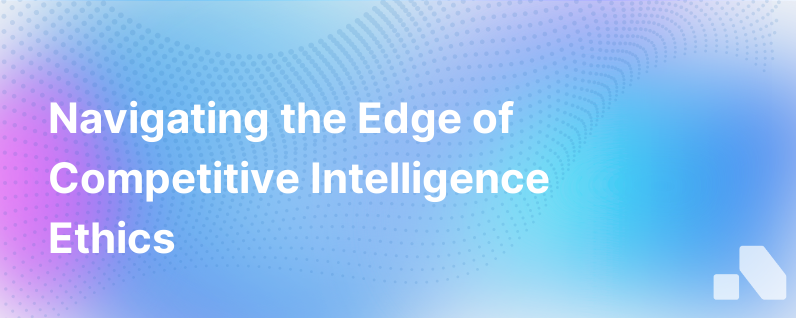When Competitive Intelligence Goes Too Far
Published on September 4, 2023 by David Zhang
In the realm of business, staying competitive is crucial. To keep pace with and surpass rivals, companies are increasingly leaning on competitive intelligence – the art of gathering, analyzing, and applying information about the competitive landscape. Done ethically and legally, competitive intelligence can provide valuable insights about market trends, customer behavior, and competitors' strengths and weaknesses. However, the line between ethical data collection and invasive information gathering can be blurry, leading to situations where competitive intelligence goes too far. Dealing with such a scenario requires an understanding of what constitutes unethical competitive intelligence, its implications, and how to effectively navigate the information minefield.
Where Competitive Intelligence Crosses the Line
Naturally, businesses desire as much information about their competitors as possible. However, when data gathering involves invasive, unethical, or illegal methods, it crosses into dangerous territory. Examples include hacking, deception, or misrepresentation to obtain private data. This can even extend to privacy violations such as stealing, wiretapping, or illegal surveillance. These actions not only violate trust but can also lead to legal implications for businesses.
Potential Implications of Unethical Competitive Intelligence
Conducting competitive intelligence in unethical manners can lead to severe consequences, including:
-
Legal repercussions: Depending on jurisdiction, privacy laws can impose serious penalties, including fines and imprisonment, for illegal information gathering activities.
-
Damage to company reputation: In today's connected world, news of unethical corporate behavior spreads like wildfire, damaging a company's reputation, which can impact customer loyalty and trust, affecting sales and bottom-line.
-
Loss of morale: When employees become aware that their company is conducting unethical practices, it can lead to a decrease in employee morale and productivity. This could potentially lead to loss of valuable employees.
-
Unforeseen business risks: The information obtained unethically may not always be accurate; thus, basing critical business decisions on such information can lead to flawed strategies.
Navigating the Information Gathering Minefield
Given these potential risks, how can a business conduct competitive intelligence without crossing the line? Here are several strategies we suggest:
-
Understand the boundaries: A good starting place is to have a clear understanding of your country's laws and regulations regarding data protection, privacy, and corporate espionage.
-
Develop a strong ethics policy: Make it clear from the top down that unethical data collection practices are not tolerated by developing and enforcing a stringent ethics policy. Make sure that your hires, especially those involved with competitive intelligence, are well versed in what they can and can't do.
-
Safeguard against malicious activity: Implement robust data protection measures to ensure employees cannot misuse information or engage in unethical activities.
-
Promote Transparency: Clearly communicate why competitive intelligence is necessary and how it is obtained. When the entire organization understands the reasons behind these actions, there is less chance of misunderstandings or misuse by employees.
-
Delegate responsibility: The responsibility of competitive intelligence should lie with a dedicated team that adheres strictly to ethical standards and compliance guidelines. This team should ensure they adhere to the legal boundaries of information gathering.
-
Use Ethical Intelligence Tools: Use dedicated AI services like Aomni, which compile data through ethical and legal means. These platforms gather useful insights about competitors, customers, and the industry without violating privacy laws or resorting to malicious practices.
Reporting Unethical Activities
If you spot unethical competitive intelligence practices, report it immediately. There's no benefit in turning a blind eye, and doing so could potentially damage your career as well as the company's status. Internally, addressing the situation with a senior executive, HR, or through a designated whistleblower hotline is the first step. If the company doesn't act, alerting a regulatory body or authority might be necessary.
Conclusion
Competitive intelligence can be a significant boon for any company, providing crucial insights into market trends and opponent behavior. However, if this practice crosses into the realm of unethical or illegal activity, it can lead to severe consequences, including legal penalties and reputational damage. Striking a balance between knowledge gathering and respecting legal and privacy boundaries requires a clear understanding of what's permissible, strong ethical guidelines, secure data protection measures, transparency, and responsible handling of issues. Leveraging tools like Aomni for ethical and insightful competitive intelligence compounds the benefits while mitigating risks.